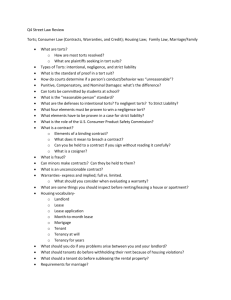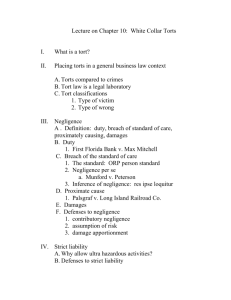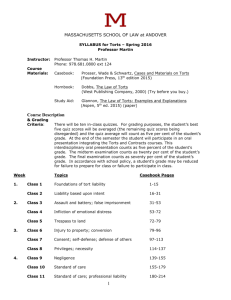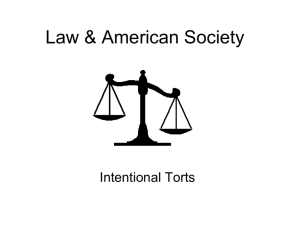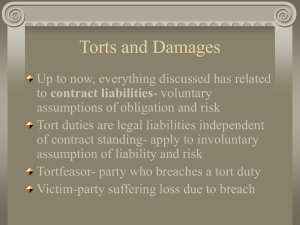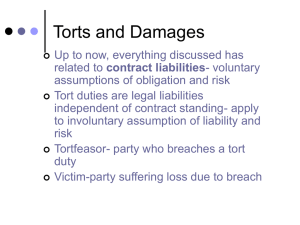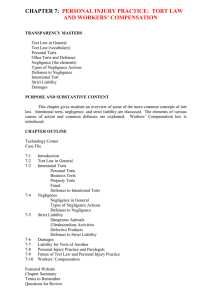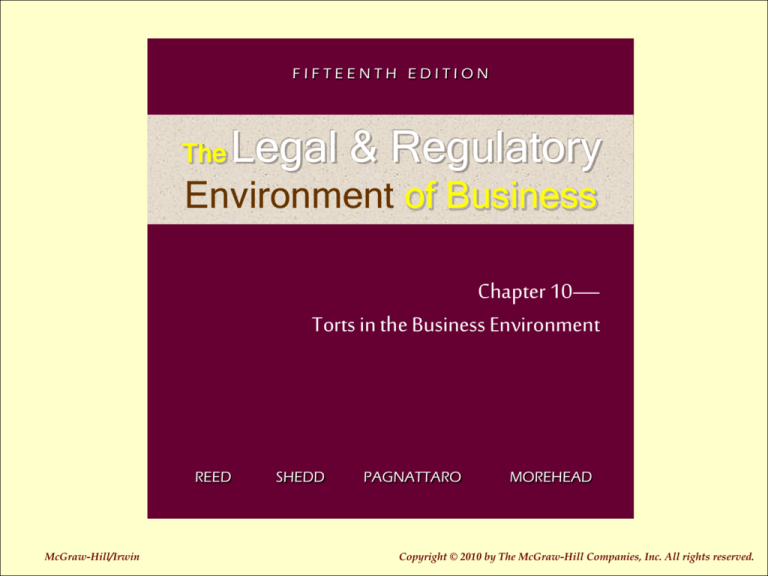
FIFTEENTH EDITION
The
Legal & Regulatory
Environment of Business
Chapter 10—
Torts in the Business Environment
REED
McGraw-Hill/Irwin
SHEDD
PAGNATTARO
MOREHEAD
Copyright © 2010 by The McGraw-Hill Companies, Inc. All rights reserved.
10-1
Learning Objectives
To appreciate how tort law is related to
property.
To understand the three divisions of torts and
to develop a theory of why torts are so divided.
To be able to explain the elements of
negligence and to relate these elements to the
development of negligence law.
To grasp why tort litigation is so controversial
in society today.
To be able to explain why some torts are also
crimes.
10-2
Tort
Definition
A civil
wrong
other than
breach of
contract
Tort law
limits how
people act
and use their
resources
10-3
Categories Of Torts
Intentional Negligent
Strict
Liability
10-4
Intentional Torts
Deliberate
Action
Causes
INJURY
10-5
Intentional Torts
Either:
• Desire to bring about
Deliberate
Action
certain results
• Results are
substantially likely
10-6
Intentional Torts Types
Assault & Battery
Trespass
Infliction Of Mental
Distress
Conversion
Defamation- Public Or
Private Person
Fraud
Common Law
Business Torts
Invasion Of Privacy
False Imprisonment &
Malicious Prosecution
10-7
Common Law
Business Torts
Injurious Falsehood- Trade
Disparagement
Intentional Interference With
Contractual Relations
10-8
Negligence
Definition
Unreasonable
behavior that
causes injury.
10-9
Negligence ‘A, B, Cs’
A
Duty
Of Care
A
B
(Unreasonable
Behavior)
C
Causation
(Fact &
Proximate)
+
Breach
Of Duty
+
Damages
D
10-10
Proximate Causation
Injury ‘in fact’ not sufficient
Proximate cause = legal
cause
Was injury ‘foreseeable’ or
reasonable to expect.
10-11
Negligence Defenses
Affirmative Defenses
Contributory Negligence
(Plaintiff’s own fault)
( now offset by
Comparative responsibility)
Assumption of Risk
(Plaintiff’s knowing
and willing
undertaking of an
activity)
10-12
Strict Liability In Tort
Strict products liabilityunreasonably dangerous defective
products
Production defect
Design defect
Warning defect
Respondeat superior- scope
of employment
Ultrahazardous activity
10-13
Other Strict Liability Torts
Dram Shop Acts – Tavern owner liable for
intoxicated patrons
Common Carriers - Damage To Goods
Being Transported, except
Acts Of God
Action Of Alien Enemy
Order Of Public Authority
Inherent Nature Of Goods
Misconduct Of Shipper
10-14
pop pop pop
QUIZQUIZQUIZ
Best Box Company advertises so effectively
that National Products, Inc. stops doing
business with Average Package Corp. Best
is liable for:
a. Appropriation
b. Wrongful interference with a contractual
relationship
c. Wrongful interference with a business
relationship
d.None of the above
10-15
think think think
TANK TANK TANK
Identify and describe the elements
of a cause of action based on
negligence.
10-16
Damages
Compensatory
Damages
Punitive
Damages
Compensate Plaintiff
For Injuries Suffered
Used To Punish
Defendant
Types:
Past/Future Medical Expense
Past/Future Economic Losses
Past/Future Pain Suffering
Negligent Behavior
“Gross” or “Willful &
Wanton”
Exemplary Damages
Calculation - Difficult
10-17
Highest Jury Tort Awards
(2007)
$109
Million
Medical Malpractice
$103
Million
Negligent
Security
$55
Million
Defective Truck
Transmission
The Crucial Controversy In Personal
Injury Torts Is In The Area Of Damages.
10-18
Alternatives To Tort System
Disadvantages
Contingency fee
Legal expenses
Punitive damages
Rarely costeffective
Alternatives
• Arbitration
• No-fault
insurance
• Workers’
Compensation
10-19
Workers’ Compensation Acts
Protect Employees/Families From JobRelated Risks
Employer Acted Unreasonably
Tests For Compensation
Injury Accidental
Result Of Employment
Exclusive Remedy Rule
10-20
think think think
TANK TANK TANK
Television reporters get jobs at a local
grocery store by misrepresenting
information about themselves in order to
do a story about the store’s alleged sale
of out-of-date meat. Are the reporters liable?
a. Yes
b. No
10-21


